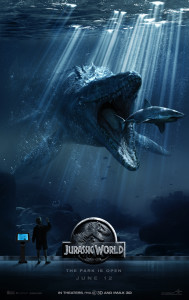Once in a while, we all need to escape. Stepping inside the sanctuary of a movie theater is the ideal diversion—a way to forget about one’s troubles for a while. So let’s soak in the escape for a moment and talk about Michael Crichton.
For those of you who don’t know Michael Crichton, he is the man who wrote Jurassic Park.—the man largely responsible for bringing dinosaurs to the big screen, and thus the one who forged the long-awaited, multi-million dollar images for fossil-enthused boys and their fathers. Crichton’s gritty story telling coupled with the magical direction of Spielberg has produced a string of potent blockbusters. Such a duo hasn’t been seen since Marty Mcfly and Doc.
The Jurassic Park novels are written as a warning to scientists using their new-found, god-like abilities in the laboratory to create or reanimate the dead or extinct. The theme of the entire series is, essentially, a retelling of the Mary Shelly classic, Frankenstein.
The point of every movie and novel is simple: If you think you have everything under control, think again. Some variable will destroy your preconceived notions in blood splatter; whether it’s the ferocity of a dinosaur or the greed of a human being, it all ends up in mass death. Don’t fiddle with extinct monsters. Just because they’re ancient doesn’t mean they’re docile. In other words: Don’t play god.
The first of the franchise, Jurassic Park (1993), grossed over a billion dollars. The Lost World: Jurassic Park (1997), earned over 500 million, and Jurassic Park III (2001) brought in a respectable $350 million—all stellar hits from the box-office perspective. While the first film, Jurassic Park, is the 18th highest grossing film of all time and is the oldest of the top twenty money-makers in the history of Hollywood, incredibly, Jurassic World has already overtaken it at the box office. How’s that for a successful franchise!
Like the previous three films, Jurassic World follows the same Jurassic formula: Kids in peril; leading man; leading lady, with everybody eaten by dinosaurs. The leading man (Chris Pratt) is probably the biggest attraction other than the dinosaurs. Pratt plays a stern character that tries to imitate Clint Eastwood but always manages to break character in some quirky sort of “everyman” idiosyncrasy; whether by way of his countenance or voice, Pratt manages to artfully avoid the stiffness leading men often coddle in big box office films.
If you’re the polar opposite of an art-house goon then this movie is for you. A corny yet all American slice of catastrophe mixed in with some witty banter, growing pains, thoroughly drenched in a thick, delicious sauce of blood and guts served very rare. It’s a good film with good suspense and great leads; well worth seeing. (Good enough that I’ve seen the film twice!)
Jurassic World stands out from the rest of the franchise because it’s a compilation of the best cuts of the previous pictures into one delectable mash-up. Another of Jurassic World’s strengths is how it captures the wonder of seeing dinosaurs at a Disney-like theme park located just west of Costa Rica in the Pacific Ocean. Just try to imagine that—you can’t! So just go see the movie. Hollywood has a better imagination than you.
And do yourself a favor, see it in Imax 3D—it really brings out the beasts’ good side.